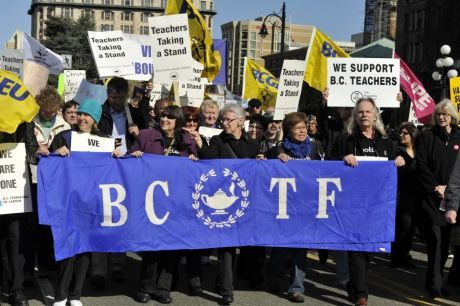Features
You are here
Are the courts a solution to the stripping of BC teachers’ contracts?

May 27, 2015
At recess time on April 30 of this year, many public school teachers around BC pulled out their smartphones to find out whether or not their union, the BC Teachers Federation, had won their court case. Unfortunately, they were disappointed: in a 4-1 decision, the BC Court of Appeal ruled that the province did not violate teachers' constitutional rights when it introduced Bill 22 in 2012 — legislation that temporarily prevented teacher bargaining on class size and composition.
Teachers were understandably upset, especially since the ruling meant the government was under no legal obligation to restore class size limits and ratios stripped out by Bill 28 in 2002 — legislation that has since been deemed unconstitutional. The BCTF executive has decided to appeal this decision to the Supreme Court of Canada.
But for socialists and union activists, the decision to continue the court battle should not be automatic. It is worth having a discussion about whether it is a viable strategy for winning back our lost contract language. Legal victories do matter because they can give confidence to the labour movement, but the main priority needs to be mobilizing rank-and-file workers and building community alliance—and sometimes a legal strategy can divert time, money and focus from this task.
Court costs: time, money and priorities
While some teachers have argued that the union hasn’t counterposed the legal and the activist strategies to regain lost contract language on class size and composition, in fact, I don't believe that is accurate. Because the 13 year court battle has been so costly, funding it has meant diverting money from other places, like our strike fund. This meant that we had less than a week’s worth of strike pay per teacher for our recent five-week strike, which had a negative impact on our ability to stay out.
Another problem with putting our faith in the court case is that whatever the results in the courts, teachers are still going to have to negotiate to get class size and composition back into our contract. The courts made it clear that they would ultimately leave it up to negotiations to determine whether the sections that were stripped would be restored. And what was the outcome of the strike even with the moral victory in BC Supreme Court? That's right, no restoration of the stripped class size provisions.
Giving the court battle priority over job action and the activity of rank and file workers is not a good strategy because it affects our ability to fight. I spoke to teachers on my picket line during job action who wanted to defy the Labour Relations Board rulings that required us to submit grade 10, 11 and 12 final marks while we were picketing in June. However, the message that I and fellow staff reps heard at our meetings was that we sould not do anything illegal, since that would jeopardize the court case. This was incredibly demobilizing for teachers, and meant that striking at the end of the year became strategically a terrible idea; if we weren't willing to use final marks as a bargaining chip, we were left to continue our strike over the summer—when our picket lines were weak and had little impact.
Telling teachers to wait for the court case to win their demands also teaches them the wrong lesson: that other people will win your strike for you, rather than encouraging teachers to have confidence in their own ability to fight for gains. This is why I think that it is very hard to pursue the legal avenue without it having a negative effect in this case. The message coming from the leadership of the BCTF as well as the BCFed has been to put our faith in the courts (and in electing an NDP, or at least a non-Liberal government), and they will fix this for us. As socialists, I think we know that this isn't how positive change happens; the courts and the NDP only respond to public pressure.
Class action
As socialists in our union, I think it is our job to keep reminding people of the history of how gains have been made in the past—by strikes and mass movements that made it so that governments and courts had no choice but to support progressive changes. Granted, it's harder to point to examples of wins nowadays when the union movement is in retreat, and austerity is the order of the day, but examples do come to mind.
The fight for $15 in the US is one great example. Minimum wage workers in LA just won a 67 per cent pay increase over 5 years. That was not the result of negotiations or court battles but the result of mass mobilization and class solidarity. Any negotiations that ensue ultimately depend on the continuing level of that class action for their outcome.
So what should BC teachers focus on if not the court case? We should make building solidarity with parents, students and working people in our communities a priority, as well as developing a layer of activists in our union who are willing to push for this alternative strategy. As a fellow teacher-activist recently articulated, this is slow and sometimes difficult work, but there are no shortcuts; it is the only way to build a union that can actually make gains against the neoliberal agenda.
Section:










